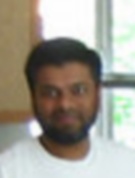by Asim Jalis
I am struck by the fact that Godel's proof is really simple and
elegant. It has the same flavor as Russell's paradox (consider
the set that contains all the sets that don't contain themselves
-- does this set contain itself?).
The trick of expressing mathematical statements as numbers seems
obvious now given that we do this in computers all the time, but
was probably a little less accessible in 1931.
Now the interesting this about this is that in my model theory
class at Wisconsin we spent several weeks on forcings, which are
a generalization of Godel's idea. And then finally covered
Godel's proof as a minor example of the powerful concept of
forcings.
In retrospect this was precisely the wrong way to do this. The
course should have talked about Godel first. Everyone is
motivated to learn about Godel's theorem. That can easily be the
highlight of the course. And then once people became familiar
with Godel's ideas, then we could have generalized it.
But this was not a one-off incident. For some reason the
general->specific route was taken in the majority of the courses
that I took, when the specific->general would have been a much
more entertaining and engaging journey.
In Utah the program was much easier. In some ways I was educating
myself, and was free to go from specific->general, if that was
what I wanted.
So I am trying to think why the professors would go from
general->specific? General->specific makes more sense if people
are already familiar with the material -- if they are already
familiar with the specific cases. So the general case will
immediately appeal to them. It would also make sense if they are
familiar with both the general and the specific, and if the
course is meant to be a quick summary of the field. It is much
faster to move through general ideas than to move through
specific examples. So maybe the professors were interested in
catching up with the cutting edge of the field quickly, so that
they could introduce students to current research.
Another explanation might be that the professors actually found
it easier (in the way they thought) to go from general->specific.
This was how they organized the information in their heads.
It was like there were two kinds of people in math. The first
kind can take a system in complete abstraction, without needing
any kind of grounding to reality, and can play with it and
extract all kinds of results related to it.
The upside of this approach (if your mind works like this) is
that you can get up to speed quickly. You can crank out a lot of
results. You can get published. In fact you can get published
regularly. Math turns into work.
The downside to this approach might be that it is harder to
evaluate which results are more interesting or relevant.
The second approach is to start with concrete grounded examples,
such as Godel's proof, and then generalize the ideas up. The
downside of this approach might be that it takes longer to get up
to speed. The upside might be that you always have several
alternate models to fall back on. If you hit a problem in the
general case, you can fall back on the specific case and see how
you would solve the problem there.
Plus, this might not even be a matter of choice. Maybe you go
with whatever approach fits your brain naturally.
Perhaps this is the INTP-INTJ difference. INTJ's are much better
at taking an abstract ungrounded system and carrying it to its
logical conclusion, while INTPs need the grounding to make the
system appear meaningful and to make real progress in it.
At different phases in the evolution of a science or a field of
mathematics, different kinds of skills might be necessary.
In choosing graduate schools it seems to me that there are two
ways to go about it:
(a) Either one should find a school where the INTP approach is
dominant. In this case the faculty will automatically be
interested in the kinds of problems that follow this grounding
pattern. It will be easy to fit into this ecology.
(b) The other approach is to go to a school which is not
extremely competitive, where there is a lot of slack, and free
time to pursue one's own interests.


